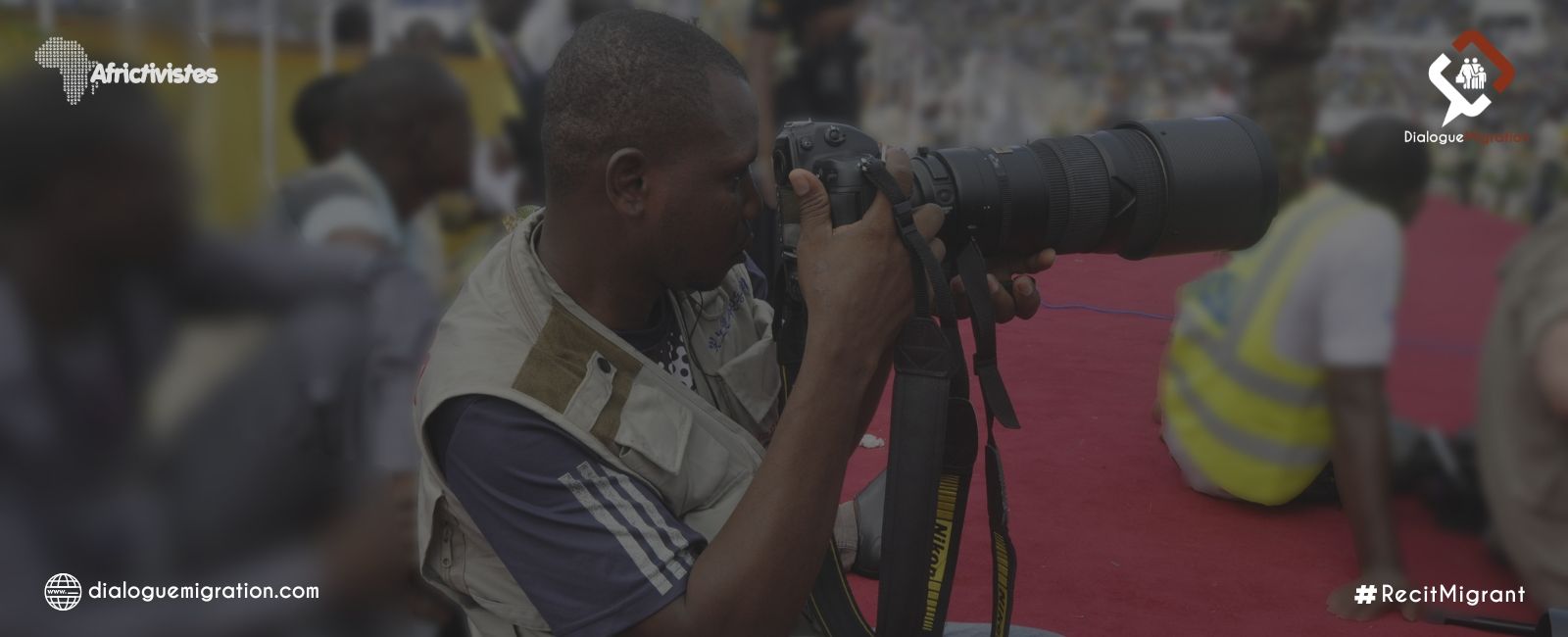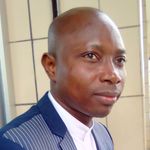

Jacob Kossonou left his country of origin, Côte d’Ivoire and has been living in Benin for 12 years for professional reasons in the turmoil of the political crisis of 2010-2011. Formerly -employed in a photo laboratory, he now owns a photo-video studio in the country while integrating into the Beninese community. Dialogue Migration, dives into his professional world in Benin, with a focus on his integration and prospects as well as his journey from Abidjan to Cotonou during the Ivorian crisis.
It is in Aïdégnon, a suburb of Cotonou on the ground floor of the “Foundohou” building that Jacob Kossonou’s photo-video studio is located. The owner of the studio, “Etoiles du Monde”, has employed a Beninese secretary to run the place smoothly. He also works with Beninese collaborators for filming. One request led to another from the surrounding clientele. Jacob has forged links with acquaintances from his current adopted country that allow him to run his business; and remains divided between private services and contracts with local organisations .
Today, Jacob Kossonou defines himself as an all-around professional as illustrated by the name of his studio “Etoiles du Monde” (Stars of the world).
“I am a photographer, I can say international or photographer without borders,” he says. In his environment, he is sociable. His neighbourhood as well as the customers we have met in his workplace confirm that he is well integrated. “He’s a very nice person. If you are not told that he is Ivorian, you will not know; it’s only his accent that might betray him. If not, we’ve been living together here for years,” says Mathias Sogbossi, a neighbour.
One evening in May 2023 , Jacob had left his studio without turning on the light. one of his neighbours took it upon himself to activate the lighting to avoid leaving the premises in the dark, since his secretary was off that day. A gesture that testifies to the fraternal and human relations he maintains with his neighbours.
In his residence area, located not far from his studio, even children express closeness and attachment to him through the exchanges engaged in since seeing him.
Integration through experiences
After more than a decade in Benin with his parents in Côte d’Ivoire only twice, Jacob Kossonou has learned a lot about Beninese culture and appreciates the way of life in the country. “We say when you go to a country where people walk with their heads, you have to walk with your head,”(editor’s note: When in Rome do as the Romans) Jacob says about his integration. As an employee, he had to adjust to the new situation in order to accommodate his Beninese colleagues given the cultural differences. “When I arrived, I did not understand the Fon (editor’s note – predominant local language in southern Benin). But today, I understand a little. When I came, I saw the Zémidjan men (editor’s note-motorcycle taxi drivers) who are in yellow. I said, what’s that? I was told they are motorcycle taxis.Stuff I’ve never seen before in Côte d’Ivoire.”. As soon as Jacob started work, he began by acquiring photography equipment for personal use. “When my employer lowered the terms of my contract after a few years, I worked for two months before leaving. My first location was in the heart of Cotonou. And little by little, it kicked off… “, he says. He left the premises for the outskirts of Cotonou where he is until now after authorities began clearing public spaces in 2017.
“I had asked for a two-week leave to go to Abidjan, before going to the village, and I missed the deadline. When I arrived, they said that from that day they would no longer pay for my house. And the little money I had on me, I opened my studio with it,” he says of the reasons for leaving his previous position. The photo lab that employed him was opposite the secondary entrance of a renowned private school in Cotonou. One day, he went to eat in a restaurant, a customer paid for his order he went to express his gratitude, the latter gave him another ten thousand CFA francs. A generous act among many that Jacob has not forgotten. As a foreigner in Benin, he could only rely on his income. Sometimes he even resorted to salary advances to meet his basic needs. “He told me he loves Ivorian. I’m not sure if he lived in Côte d’Ivoire, but he’s a businessman,” says Jacob. “Apart from that, people have helped me more than that, but this experience has marked me,” he admits. “What made me grow is not the money, it’s my relationships,” says Jacob Kossonou.
From Abidjan to Cotonou
Jacob Kossonou experienced the horrors of the 2010-2011 crises in Côte d’Ivoire, before landing in Benin. He was in Abidjan and worked for Sékongo Nagnéh, a renowned photographer (editor’s note-Photographer of former President Laurent Gbagbo) who had photo studios in the country. “In Abidjan, we had two studios, one in Septième tranche in Angré and another in the Pharmacie Nouveau quartier, where I was the manager. From there, I was sent to Yamoussoukro on the Cayman Lake side in 2011,” he says. He worked there as a cameraman and also did image processing with Photoshop. “The crisis turned my life upside down and I had to return to the village. I was there when my employer contacted me who was at the time the Managing Directors of Benin Customs. He told me he needed a professional photographer. I had been recommended by Mr. Lamine, a Senegalese technician who processed our Kodak-based equipment in Abidjan. Its structure had an annex in Benin, and shuttled between Côte d’Ivoire and Benin. It was through him that the equipment of the Benin studio where I was to come to work was sent,” he says.
Jacob Kossonou recalls as if it were yesterday, the conditions in which he returned to his village before joining Cotonou. “My wife was full-term, and she had to give birth. We had to go to the hospital and there was no car. It was towards the end of 2010 and we didn’t know how to handle it. I called a mechanic friend, who accompanied us, because the cars do not come out at midnight. There was a curfew. My wife gave birth to my second child at about 4 a.m. ,” he says.
In early 2011, when the situation degenerated in Abidjan, while he was stationed in Yamoussoukro, he picked his wife up from Yopougon and headed to Adjamé where they took the bus to their village, Boudoukou. Jacob describes scenes of helicopters and people running around. “There was no Gbaka (editor’s note: public transport bus in Abidjan). We finally made the journey on foot.I did not sleep in Abidjan. I went back to Yamoussoukro,” he says. Back in Yamoussoukro, from where mortar fire could be heard, Jacob could not take it anymore and had headaches, because his little brother was in Abidjan.”I called him and he told me it’s not okay. When you go out, even to buy bread, it’s to queue and we walk on corpses in the street,” he says. He will stay barely a week in Yamoussoukro before taking the road to his village. His younger brother was stuck in Abidjan, no more ways out of the city. On the way to his village, students, police, military and gendarmes were not welcome at the barriers erected on the corridor. “When I left, I had my ID. When we arrived at the checkpoints, they lifted our pants to see if there were any traces of rangers. He said he was a computer scientist and sometimes wore boots to go to the field. It was when he arrived at his destination in Bongrou that he told me he was an officer,” he says. “On the corridor, this is where you least expect to see barriers from armed men,” Jacob argues. “While they ask for gifts or money, you have to comply not to get out of the vehicle, or beg them to let you continue the journey in case you do not have any”.
Following his journey, Jacob Kossonou had returned to his village Bondoukou, which is located in the east of Côte d’Ivoire, on the border with Ghana. Following his opportunity to come and work in Benin, “I took shortcuts. I did not come to Abidjan anymore. Given my situation, my employer asked me to come and once in Benin, he will pay me. I went through Bondoukou to fall in Domagnikro, which is in Ghana and I took a bus from there to Benin,” he says.
With his experiences, “from Côte d’Ivoire, I told myself that everyone is a foreigner. Today, those who are in Benin can find themselves in Côte d’Ivoire or Europe. What happens to it? So, we can say that everyone is a foreigner. If we can understand that, that would be good,” advises Jacob.
Looking ahead, Jacob may be thinking of returning to his country for his old age after making achievements that allowed him to spend his retirement free from want.


